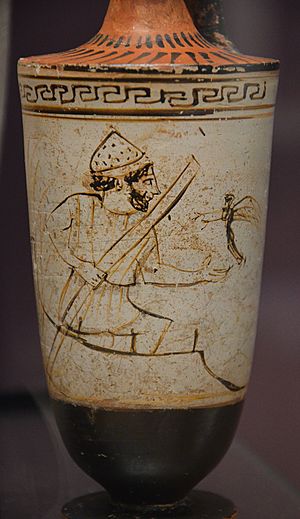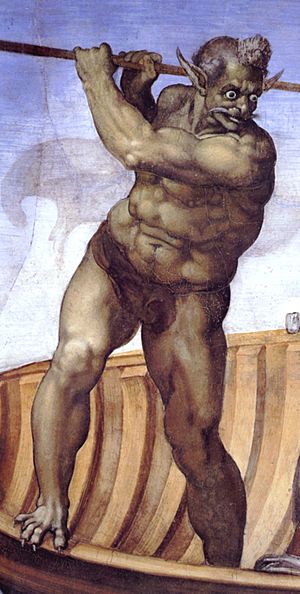Charon facts for kids
Charon is a name that means different things! It can refer to a famous character from ancient Greek stories or a moon orbiting the dwarf planet Pluto.
Contents
Charon in Greek Mythology
In ancient Greek mythology, Charon (pronounced KAIR-on) was known as the ferryman of the dead. His job was to carry the souls of people who had passed away across a special river.
Who is Charon?
Charon was often shown as an old, grumpy man with a beard. He wore a simple tunic and carried a long pole to steer his boat. He was a very important figure in the Greek underworld, which was the place where souls went after death.
The River Styx
The river Charon ferried souls across was usually the River Styx. This river was believed to separate the world of the living from the world of the dead. Sometimes, other rivers like the Acheron were also mentioned.
Paying the Ferryman
To cross the river, souls had to pay Charon a small fee. This fee was a coin, often an obol, which was placed under the tongue of the deceased person before burial. If a soul couldn't pay, they were left to wander the riverbanks forever. This shows how important burial rituals were to the ancient Greeks.

Charon, Pluto's Moon
Charon is also the largest moon of the dwarf planet, Pluto. It's so big that sometimes Pluto and Charon are called a "double dwarf planet system."
Discovering Charon
Charon was discovered on June 22, 1978, by astronomer James Christy. He noticed that images of Pluto looked a bit stretched, suggesting there was another object orbiting it. It was named after the mythological ferryman because Pluto is named after the god of the underworld.
Charon's Features
Charon is about half the size of Pluto. It has a reddish-brown polar cap, which scientists think might be made of frozen gases that escaped from Pluto. Charon also has large canyons and mountains.
A Binary System?
Pluto and Charon orbit each other in a very special way. They are tidally locked, meaning they always show the same face to each other. They also orbit a point in space between them, rather than Charon just orbiting Pluto. This is why some scientists call them a "binary system."
See also
 In Spanish: Caronte (mitología) para niños
In Spanish: Caronte (mitología) para niños
 | Roy Wilkins |
 | John Lewis |
 | Linda Carol Brown |


